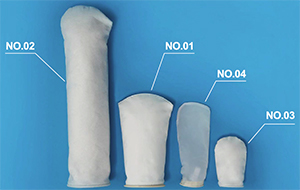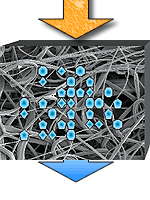- Flow Rate Considerations
- Design Features
- Removal Efficiency
- Chemical Compatibity
- General Considerations

A Bag Filter System is a highly adaptable to virtually any liquid and viscosity. The liquid flows through the inside to the outside of the bag trapping the particles. Bag Filter Vessels are available in Single or Multi Bag units. Multi Bag units offer large surface area and high flow rates. The filter bags have a comparable long life and require little maintenance when sized correctly.
Monarch Bag Filter Vessels are capable of following the flow rates. The rates are based on filtering water which has a viscosity of 1 c.p through a Nominal Rated Filter Bag. When your application requires the fitting of High Efficiency media, please consult our sales staff for a sizing recommendations.
Filter Bag Sizes - Flow rates are based on using a Nominal rated filter bag.
| Size | Flow rate | Dimensions | Flow Area |
|---|---|---|---|
| 01# | 20,000 (lt per hour) | Ø178mm x 420mm | 0.24 m² |
| 02# | 40,000 (lt per hour) | Ø178mm x 810mm | 0.48 m² |
| 03# | 6,000 (lt per hour) | Ø102mm x 230mm | 0.08 m² |
| 04# | 12,000 (lt per hour) | Ø102mm x 410mm | 0.16 m² |
Flow rate capability example:
- 4 bag housing is rated at 160,000 lt per hour @ 1 c.p. nominal rated bag (4 x 40,000 lt per hour)
- 6 bag housing is rated at 240,000 lt per hour @ 1 c.p. nominal rated bag (6 x 40,000 lt per hour)
Need Assistance?
Phone: +61 (0) 7 3889 9949 to discuss your application with our technical staff or,send details of your application to sales@monarchindustrial.com.au
Each vessel model or style has specific design features. Please contact us to discuss your application and the most suitable design to suit your needs.
- TBF Design - Featuring a "goose neck" or "over-the-top" inlet design
- SBF Design – Side entry inlet, mid-priced and extensively used for industrial applications
- FBF Design - An entry-level housing for industrial applications
Need Assistance?
Phone: +61 (0) 7 3889 9949 to discuss your application with our technical staff or,send details of your application to sales@monarchindustrial.com.au

Nominal vs High Particle Removal Efficiency
Our range of filter bags can categorised into Nominal or High Efficiency Particle Removal.
Nominal Ratings
Nominal filter ratings are an arbitrary (nominal) value, indicating a particulate size range at which the filter removes some percentage. Nominal ratings vary from manufacturer to manufacturer and cannot be used to compare filters among manufacturers. Processing or application conditions such as operating pressure, concentration of contaminant and particle type have a significant effect on the retention efficiency of the nominally-rated filters.
Absolute Ratings and High Removal Efficiency
Absolute filter ratings are a value associated with a filter, that represents the size of the smallest particle completely retained. Complete retention is within the experimental uncertainty of a standard test method consistent with the intended filter use. Among the test conditions that must be specified are particle size, challenge pressure, concentration, and detection method used to identify the contaminant.
Need Assistance?
Phone: +61 (0) 7 3889 9949 to discuss your application with our technical staff or,send details of your application to sales@monarchindustrial.com.au
Obtain all the details of the liquid/solid composition. You need to confirm the chemical compatibility to ensure the proper material is used for the bag, housing and seals.
What is the pH level of the liquid?Consdier the pH level in order to choose the proper material. Is the product an acid with a pH of 1-7 or is it Alkaline 7-14?
Need Assistance?
Phone: +61 (0) 7 3889 9949 to discuss your application with our technical staff or,send details of your application to sales@monarchindustrial.com.au
Viscosity is the resistance of a fluid to the motion of its molecules among themselves. Water, ether, and alcohol have low viscosities; heavy oil, glycerin, and syrup have high viscosities. Viscosity affects resistance directly. If all other conditions remain constant, doubling the viscosity in a filter system results in twice the original resistance to flow. Consequently, as viscosity increases, the pressure required to maintain the same flow rate increases. Centipoise is the unit of measurement comparing the viscosity of a fluid with that of water, which has a viscosity of 1 c.P.
TemperatureThe temperature at which filtration will occur can affect both the viscosity of the fluid, the corrosion rate of the filter or housing, and the filter medium compatibility. Viscous fluids generally become less viscous as temperature increases. If a fluid is too viscous, it may be advisable to preheat the fluid and to use a jacketed housing or an electrical heat jacket on the housing. Temperature also has an impact on the selection of filter media and the O-ring seals.
Solids LoadingFor example: In an application with a low flow rate and a high solid loading it may be preferable to oversize the unit providing a greater surface area and dirt holding capacity. The increased surface area provides reduced pressure resulting in increased filter life.
Are the solids crystalline or gelatinous?Crystalline solids can form a permeable layer on the filter media and gelatinous solids can form an impermeable layer that will cause blinding off of the filter media.
Need Assistance?
Phone: +61 (0) 7 3889 9949 to discuss your application with our technical staff or,send details of your application to sales@monarchindustrial.com.au
Monarch Asia Pacific Pty Ltd, Copyright © 2022 All Rights Reserved
Release: 22:1:1




